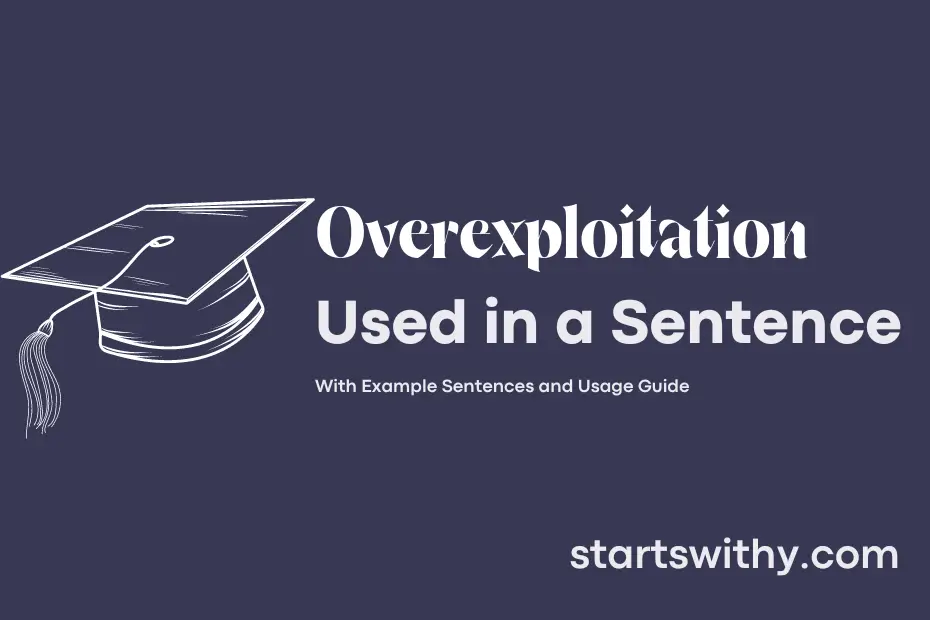Overexploitation, a term often heard in environmental and conservation circles, refers to the unsustainable use of natural resources beyond their capacity to renew. This phenomenon occurs when plants, animals, or other resources are excessively harvested or exploited, leading to detrimental effects on ecosystems and the species within them.
The consequences of overexploitation can be severe, ranging from depletion of fish stocks and loss of biodiversity to habitat destruction and ecosystem imbalance. To combat this issue, sustainable management practices and conservation efforts are crucial in order to protect our planet’s delicate ecosystems and ensure the long-term survival of species and resources.
7 Examples Of Overexploitation Used In a Sentence For Kids
- Be kind to animals and plants to avoid overexploitation.
- Let’s not take more than we need to prevent overexploitation.
- We must protect our environment from overexploitation.
- Remember, too much fishing can lead to overexploitation of marine life.
- Do not cut down too many trees as it can cause overexploitation of forests.
- It’s important to balance our use of resources to avoid overexploitation.
- Always think about how our actions can impact the world and prevent overexploitation.
14 Sentences with Overexploitation Examples
- Overexploitation of natural resources is a major concern in India’s rapidly growing economy.
- The fishing industry is suffering due to overexploitation of marine resources.
- Farmers need to be educated about the dangers of overexploitation of agricultural land.
- Urbanization has led to the overexploitation of water sources in many cities.
- Overexploitation of forests is leading to deforestation at an alarming rate.
- Students should be aware of the consequences of overexploitation on biodiversity.
- The textile industry is often criticized for its overexploitation of labor.
- The mining sector is notorious for its overexploitation of mineral resources.
- Rapid industrialization is contributing to the overexploitation of energy sources.
- The construction boom is causing overexploitation of construction materials such as sand and gravel.
- Improper waste management is leading to the overexploitation of landfills in many cities.
- The fast fashion industry is responsible for the overexploitation of textile workers in India.
- The tourism industry must find sustainable practices to avoid overexploitation of popular destinations.
- Government policies need to address the issue of overexploitation in various sectors to ensure long-term sustainability.
How To Use Overexploitation in Sentences?
Overexploitation occurs when a natural resource is used excessively, leading to its depletion. To use the word in a sentence, consider the following example:
“The overexploitation of fish in the region has resulted in a drastic decline in fish populations, impacting the local ecosystem.”
When incorporating the term overexploitation into a sentence, it is essential to highlight the negative consequences that arise from unsustainable resource usage. By emphasizing the adverse effects of overexploitation, the sentence effectively conveys the message that such practices are harmful and should be avoided.
To provide more context, you can elaborate on the specific resource being overexploited and the repercussions it has on the environment, economy, or society. For instance:
“Overexploitation of forests for timber production has led to deforestation, loss of biodiversity, and habitat destruction.”
In this sentence, the word overexploitation is used to draw attention to the harmful impact of excessive logging activities on forests and the broader ecosystem. By clearly articulating the consequences of overexploitation, you can effectively communicate the urgent need for sustainable resource management practices.
Conclusion
In conclusion, overexploitation of natural resources, such as deforestation, overfishing, and excessive hunting, has detrimental effects on the environment and biodiversity. These activities result in the depletion of vital resources, loss of habitat for countless species, and disruption of ecosystems.
It is crucial for various stakeholders, including governments, industries, and communities, to implement sustainable practices to prevent further degradation of our planet. By reducing overexploitation and promoting conservation efforts, we can protect vulnerable species, preserve biodiversity, and ensure a healthier environment for current and future generations. It is essential to strike a balance between human needs and the preservation of the natural world to safeguard our ecosystems and the well-being of all living organisms.



